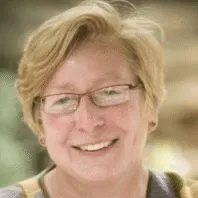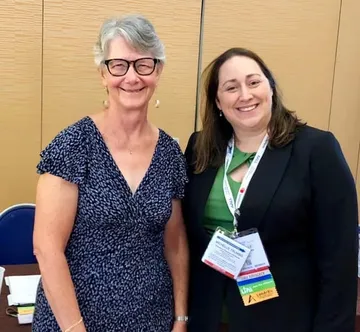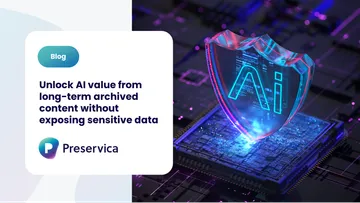Working as a Consortium to preserve our digital legal records
 Lori Ashley
•
July 30, 2018
Lori Ashley
•
July 30, 2018
The Executive Director of the Legal Information Preservation Alliance (LIPA) speaks out on the need for digital preservation
Margie Maes, Executive Director of LIPA, a non-profit consortium of over 110 state and university law libraries, dedicated to the preservation and accessibility of legal information, shares her thoughts with Lori Ashley - Industry Market Development Manager at Preservica, on the urgent need for digital preservation in the legal community to protect records that make up the cornerstone of democracy. As Maes approaches retirement, she reflects on her 10 years with LIPA.
Lori Ashley: Given your mission of preservation and accessibility of legal information, can you share some of the risks to legal information that your member institutions face?
Margie Maes: Yes, LIPA was founded on a preservation mission and over time added access to that mission. But, as more and more content has moved to websites and other digital platforms or more content has become born-digital, there is a greater risk of losing access to both historical and current legal information, and it is something that people have increasingly becoming more concerned about. Legal information is a cornerstone of democracy, and so it's vital to maintain a permanent record of legal knowledge. And that's what we try to keep in mind as we move forward with our digital preservation projects.
Lori: Can you discuss some of the trends you’ve seen in digital content over the last 10 to 15 years?
Margie: Yes, I’ll use government information as an example. As the federal government and many state governments began to publish laws and court opinions, agency reports, administrative decisions online, at some point many of them said, we shouldn't be paying to print this when everybody wants to use this information online.
So, they began transitioning into an online environment without really thinking about the long-term preservation of an electronic-only publication.
We began to see this trend start 15 years ago, and that has only increased over time.
Lori: Are people more aware of the risks today, or do you think it's still not really given much thought?
Margie: I think there is more awareness, but there is still a lot of education that needs to be done about digital preservation. State government is one thing. You multiply that by however many counties or municipalities are in each state, and, yes, there is a lot of education that needs to be done, and a lot of funding that needs to be secured to implement better preservation practices.
Lori: What are some of the obstacles?
Margie: I think that many times not just government, but other organizations, are only thinking about the bottom line and where they can save costs, and they're not really thinking about the long-term value of information. And that goes back to corporate records management too, that the need to preserve the digital records of an organization is just as critical as the need to preserve legal content that should be accessible to the citizenry, but it’s not always a top priority.
Lori: When you initially rolled out Preservica Cloud Edition Essentials for Consortia, the members included the Georgetown University Law Library, the Maryland State Law Library, and the Virginia State Law Library. Can you give us an update on the migration of their collections to Preservica?
Margie: Yes. This group of three libraries has been working together for a number of years using a different platform. Now we're migrating content into Preservica and we are about 50% through that migration. Once we get a handle on this collection and make sure that everything is in place, then we'll be ready to accept and train new members.
Lori: When you were first evaluating the Preservica Consortia offering, what were the key features that made you decide to go with this solution?
Margie: Well, I think for us the most important feature was the archiving aspect, the active digital preservation. We felt very comfortable with Preservica's approach to that. It looked to us like the system was going to be very easy to use in terms of ingesting content and making sure it was archived and preserved properly. It's also a comprehensive solution and it's highly regarded in the marketplace, so, we felt very comfortable making that selection and working with the people at Preservica.
Lori: Right now, about half of the U.S. state archives are using Preservica, to primarily ensure permanent digital records are accessible for future generations. Can you discuss any state initiatives related to preservation and access of legal information that will help these state archives keep their eye on the ball in terms of online legal information?
Margie: There is something called UELMA, which stands for the Uniform Electronic Legal Material Act. It's a uniform law that tries to address some of the concerns about publishing primary legal materials online. There are 18 states currently that have adopted that as the law for their own states. It addresses preservation and access but also the authenticity of that information.
I have been part of a broad working group trying to promote the preservation piece of that act for the states that have adopted it. Most of the states started out just by adopting the access piece and making sure that access to primary legal material in their states was available, but we have been encouraging the preservation side of it too. So, that's a very current state initiative relating to legal information.
Lori: As we work with other Consortia, are there any points of advice that you would give them as they begin to implement digital preservation?
Margie: Well, the advice I would give is to work with Preservica on training customized for Consortia, and also to think about how they want to set up their collections. They should think about if they're going to be a single collection or multiple collections under one tenancy or how that's going to work for them. My advice would be don't hesitate to ask for help or to reach out to another Consortia if they need advice.
Lori: Tell us about your next chapter.
Margie: I’ll be retiring after a decade with LIPA, and Michelle Trumbo will be joining as the new Executive Director. Michelle is also a law librarian by background – she has both a law degree and a library degree. She is very well versed in legal information, particularly electronic legal information, and has a passion for preservation.
Lori: Margie, thank you for what you've done to promote the mission of LIPA. It's really a great accomplishment.
Margie: Thank you. We appreciate that Preservica launched a Consortium offering, it's a great boon for organizations like ours.

Margie Maes (left) with incoming LIPA Executive Director Michelle Trumbo




